Ana Gildersleeve was born and raised in Valencia, Spain. When she was 8, Ana started to run track and dreamed of competing in the U.S. since it was home to her favorite athlete.
Ten years later, that dream came true; in 2013, Ana accepted a scholarship to attend a Division I school. While earning a degree, she traveled the country, competing at major track events. Later, Ana graduated with a Bachelor of Science in Education and a master’s degree in Sports Administration.
“While studying abroad, I learned a new language, and a new culture, and met wonderful people from around the world who became like family,” Ana writes on her website. “But most importantly, I learned how to get comfortable with being uncomfortable. It was an experience that I will never forget.”
This is Ana Gildersleeve, a woman who, after spending the first 18 years of her life in Spain, eventually settled in the US

Image credits: _anagildersleeve
While attending university, Ana met Matt, an American football coach. The two fell in love and got engaged in 2017. They married in Spain a year later and are now raising two beautiful kids.
Even though the couple decided to stay in the U.S., Ana often travels to Spain to see her family. Most times, their American friends tag along and she loves showing them where she grew up and everything about Spain. Staying close to her roots but also immersing herself in a new place, Ana has developed a unique point of view that allows her to compare the two. Most notably, traditions and customs surrounding a topic that’s very relevant to her now — parenting.
Ana and her husband have two kids together, and recently she decided to share her thoughts on parenting differences between the two sides of the Atlantic
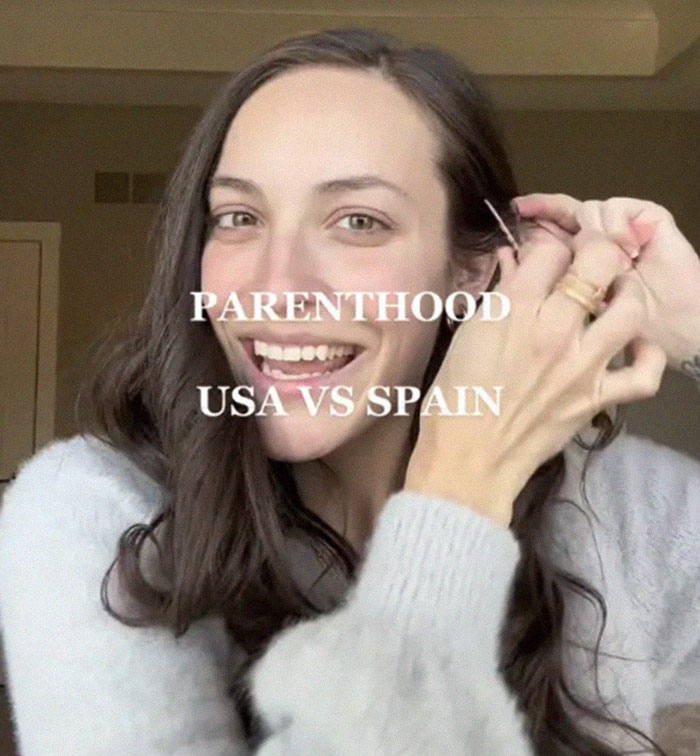
Image credits: anagildersleeve
According to her, raising children in the United States is more boring and isolating
“I think being a parent in the US is way more boring and isolating than in Spain. Someone told me, ‘I thought I was depressed, but I was just in the wrong country.’ And that’s when I was like, ‘I need to talk about this.'”
Image credits: _anagildersleeve
“First of all, most Americans don’t do anything fun during the week after work, especially if you are a parent. Let me explain. Monday through Friday, most Americans do not socialize with other people. They go straight home after work, or if you are a parent, after your kid’s activities. In general, Americans save social events for the weekend, they spend a lot of time in the house. Whereas in Spain, we are out all the time. Monday through Friday, Saturday, and Sunday. When the kids are done with school, you go to the closest playground to their school and socialize with other parents. Also, there are many playgrounds that have attached, like, a little bar or a coffee shop and it’s super normal to have a glass of wine or a beer with other parents while the kids play in the playground. That’s unthinkable in the US.”
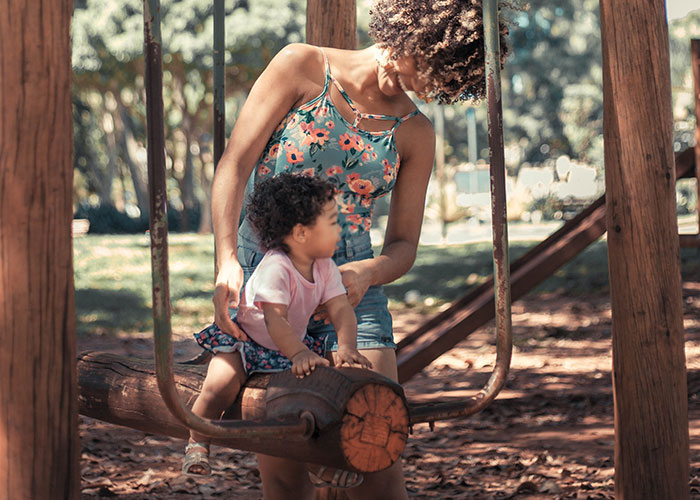
Image credits: Orione Conceição (not the actual photo)
“Second, I feel like in the US, it takes forever to meet up with your friends. You have to schedule playdates weeks and sometimes months in advance, whereas back home you’re like, ‘Hey, are you home?’ ‘Yes.’ ‘Want to meet up in 20 minutes at the park with the kids?’ ‘Yes’. ‘Okay, meet you there.’ Also, I think motherhood is way more isolating here because I feel like most Americans don’t have a village at all. Moving around the country is just pretty normal here. In Spain, most people live close to their families, like my siblings live within 20 minutes away from each other, walking. So it’s my mom, my grandma, my aunt, my cousins.”
“Another thing is that here in America, parents stop doing what they are doing even though they are having fun because they need to put their kids to bed at 7 pm. If you see a kid is still awake past 8 PM, it’s like, ‘You’re a bad mom.’ But in Spain, it doesn’t matter where you are. You just bring the stroller and the kid will fall asleep.”
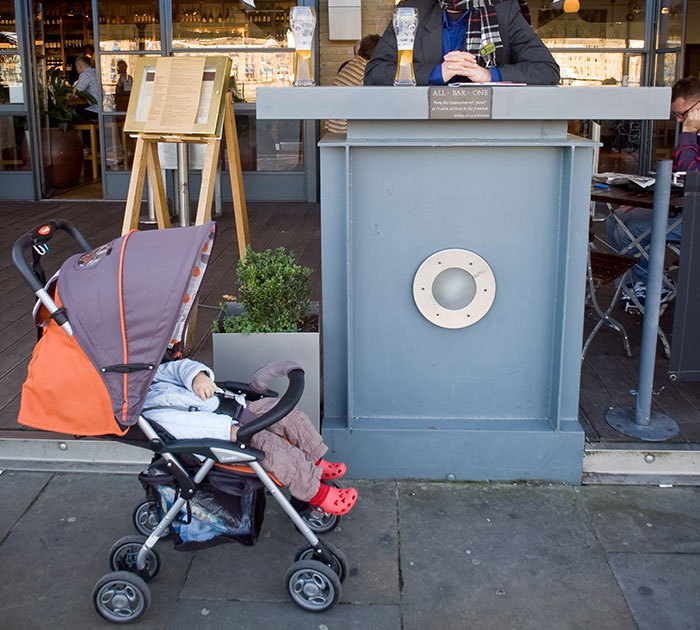
Image credits: Lars Plougmann (not the actual photo)
“And they include the kids everywhere. In the US, we separate children’s activities from adult activities. Parents organize their lives around the children’s schedule, but in Spain, children adapt to the adult’s schedule. Finally, in Spain, even though you are a mom, you keep hanging out with your girlfriends and you’ll still go to bars and clubs from time to time. But I feel like in the US when women become moms, they stop having fun. Yes, your priorities have changed but one thing doesn’t take the other. You can go to a bar or a club and get a couple of drinks with your best friends and still be a good mom.”
Image credits: _anagildersleeve
Ana’s video has been viewed over 2.3 million times
@_anagildersleeve My thoughts on parenthood/motherhood in the U.S vs Spain
#cultureshock #livingabroad #livingabroadwithkids #motherhoodjourney #mothethood #momsoftiktok #momlife #momtok #spain #usa #fypシ #learnontiktok ♬ original sound – Ana Gildersleeve
And many people agree that parenthood in Spain is a lot different
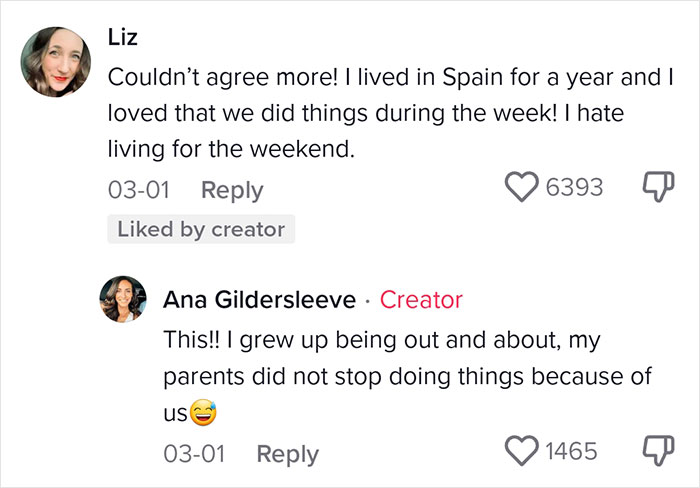

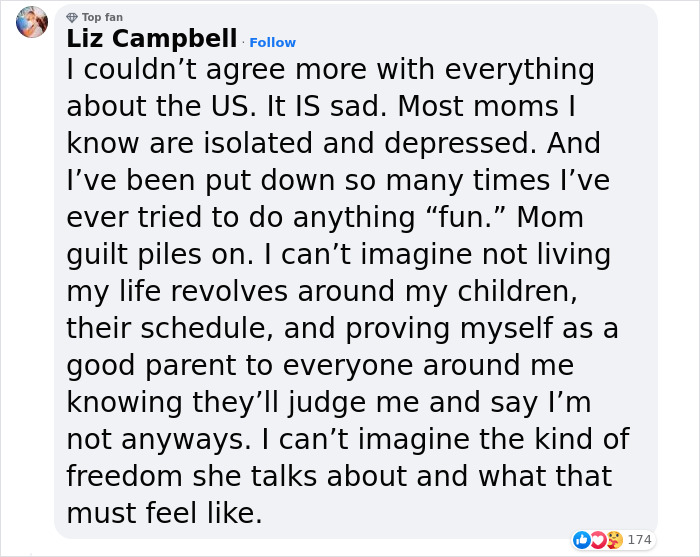


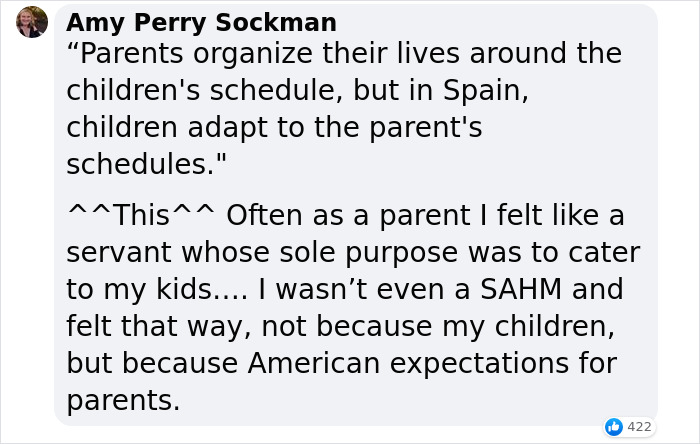






Some think it’s because of American society’s views on work and career



Ana has definitely picked up an important topic. While stress at work can cause significant problems in people’s lives, the consequences of parental burnout are different. Unlike at the office, parents don’t get paid vacation, and they can’t leave their roles, abandoning their kids the way that someone with occupational burnout can leave a company.
Because burnt-out parents often feel trapped, they may also experience more severe consequences than those going through job burnout, such as suicidal and escape ideations—researchers found these ideations were more frequent in parental burnout than in job burnout or depression.
Burnout can also cause parents to be violent or neglectful toward their children, even when they philosophically oppose those behaviors. Annette Griffith, Ph.D., a professor of psychology at The Chicago School of Professional Psychology, discovered that parents who indicated higher levels of burnout also indicated higher levels of coercive or punitive parenting practices, and the parents who reported the biggest change in burnout levels had the highest risk for child maltreatment.
Whether a burnt-out parent screams at or spanks their child, this behavior doesn’t only harm kids; it can create a vicious cycle, as parents who do these things often feel shame, so they ruminate on their behavior, then they wake up the next day more tired and sensitive, which compounds the negative actions.
Ana expanded on the topic more, pointing out the different roles children have when they’re attending weddings in Spain versus the US
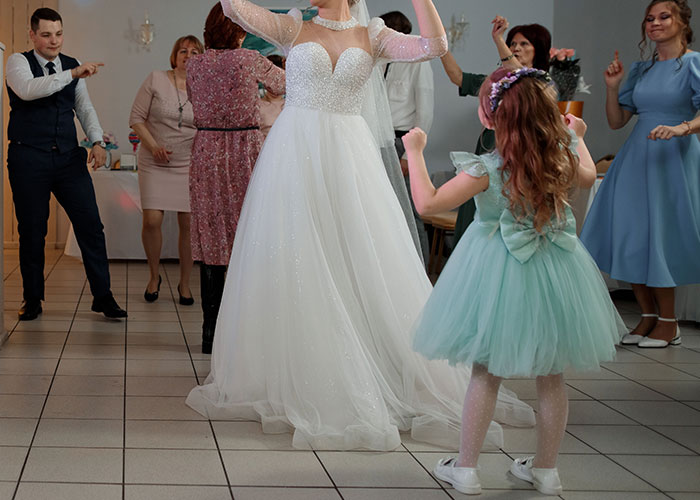
Image credits: Владимир Васильев (not the actual photo)
“Children going to weddings in Spain versus the US. This is one of the many cultural shocks I’ve experienced since I came to the US. Yes, children in Spain are always welcome to weddings. I’m sure there are some exceptions but I’ve personally never heard of a child-free wedding in Spain. Just exactly what I was talking about in my parenthood video. I explained that in Spain, adults include children everywhere. And in the US, we separate adult activities from children’s activities. And I feel like Spanish kids tend to behave in public really well because they’ve normalized being in public and so they’ve learned how to behave. But if you keep them at home or avoid taking them out in public, how are they going to learn how to behave in public?”
Image credits: _anagildersleeve
“Many people don’t see weddings as an appropriate place for kids to be mainly because:
1) Weddings are late and, you know, if your kid is not in bed by seven, you are a bad mom;
2) There’s alcohol involved. Here in the US, it’s just not common to drink in front of your child. But in Spain and most European countries, it’s normal to drink a beer or a glass of wine in front of your children. People even take their kids to a bar or a restaurant late at night. They just fall asleep in the stroller or they put two chairs together and make a cute bed. I feel like if you do that in the US, people will literally call CPS on you. Drinking is just a big part of Europeans’ everyday life. Here’s the difference. It doesn’t mean that you’re gonna get wasted. We love getting a beer or two, or a glass of wine at an outside cafe while the kids are playing in the playground.”
“So if in Spain, it’s normal to 1) bring your kids everywhere, 2) kids going to bed later at night, 3) parents being flexible with the sleeping situation, 4) alcohol not really being a big issue, then why wouldn’t you invite the kids. Makes sense? However, if you’re getting married soon, do whatever you want. It’s your wedding. If you do not want kids, people need to respect that. And if they disagree, they don’t have to go.”
This video has also received a fair share of attention
@_anagildersleeve Replying to @haluccii My opinion regarding children attending weddings in Spain vs USA #cultureshock #culturetiktok #culturetalk #learnontiktok #weddingtiktok #weddingtok #weddingplanning #spain #usa #fypシ ♬ original sound – Ana Gildersleeve
Next, Ana explained that in Spain, children are more than welcome in public spaces
“I saw this comment which says, ‘Please don’t bring your children everywhere to the adults’ activities. We don’t want them.’ You know what’s sad, that it didn’t surprise me. Because I keep seeing videos of adults complaining about kids being in public or babies being in airplanes. Pretty much, children are not being welcomed in society. This is so sad to me because I come from a country, Spain, that absolutely loves kids. There are always kids playing soccer in the street, in the plazas. People love seeing kids being kids.”
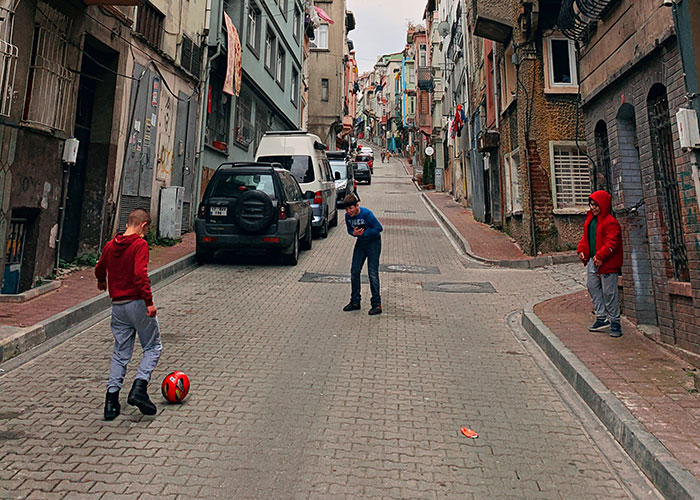
Image credits: Batın Özen (not the actual photo)
“But in the US, we expect kids to act like adults. And that’s just impossible. And this is exactly what I was talking about in my parenthood video. The person that made the comment said, ‘Please don’t bring your children to the adult activities.’ So here’s the difference; in the US, we separate children’s activities from adults’ activities, whereas in Spain, there is no child or adult activities. There’s just activities in general. Some people don’t like it and that’s okay.”
Image credits: _anagildersleeve
“We cannot exclude them from society. It’s called public space for a reason, and everyone is welcome there. Now, that doesn’t mean that I don’t believe in rules or good behavior in public. And we parents don’t like it either when our kids or babies scream in public. There’s some situations where it’s necessary to take a child into the public eye, like airplanes. The only way my kids can see my family back home in Spain is if I put them on a plane. Trust me, I wish I could do this and be there in five minutes, but I can’t. Here’s the problem. Many adults assume that a kid screaming, or having a tantrum, or a baby crying equals to bad parenting. But anyone who’s been in charge of an infant or a toddler knows that even the most perfect parent in the entire universe cannot prevent or stop every single tantrum. So, please, be kind to those with small kids. I promise you we are trying our best every single day.”
It sounds like her insights touch on the essence of the two cultures
@_anagildersleeve Replying to @lumichelini My thoughts on children being in public in Spain vs USA #cultureshock #spain #usa #livingabroad #livingabroadwithkids #culturetiktok #culturetalk #spanishculture #spaincultureshocks #spaintravel #learnontiktok #fypシ ♬ original sound – Ana Gildersleeve
And people appreciate her sharing her thoughts




The post Spanish Mom Who Lives In The US Compares The Countries' Wildly Different Parenting Styles first appeared on Bored Panda.
from Bored Panda https://ift.tt/VTQK51X
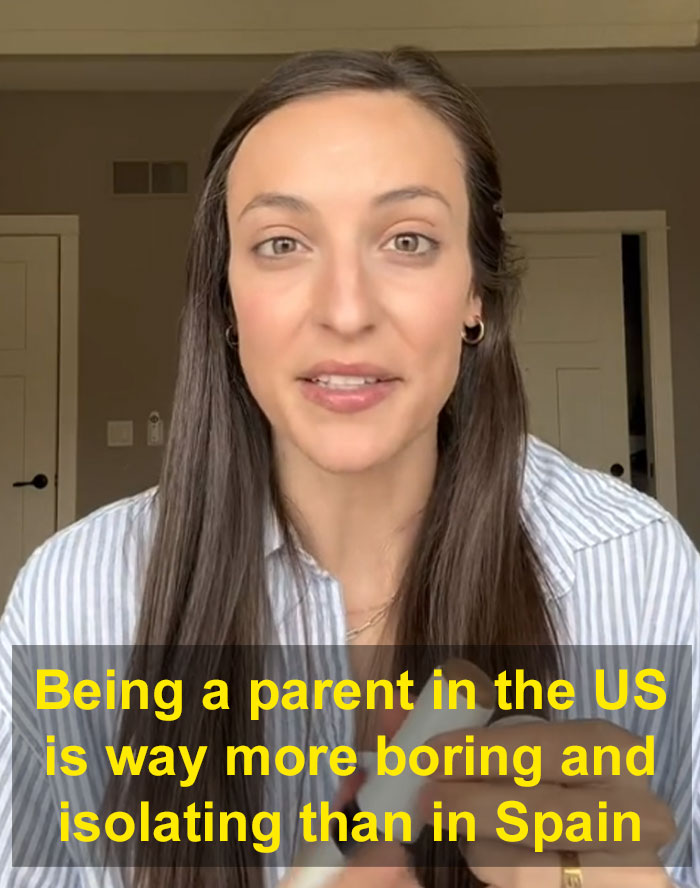
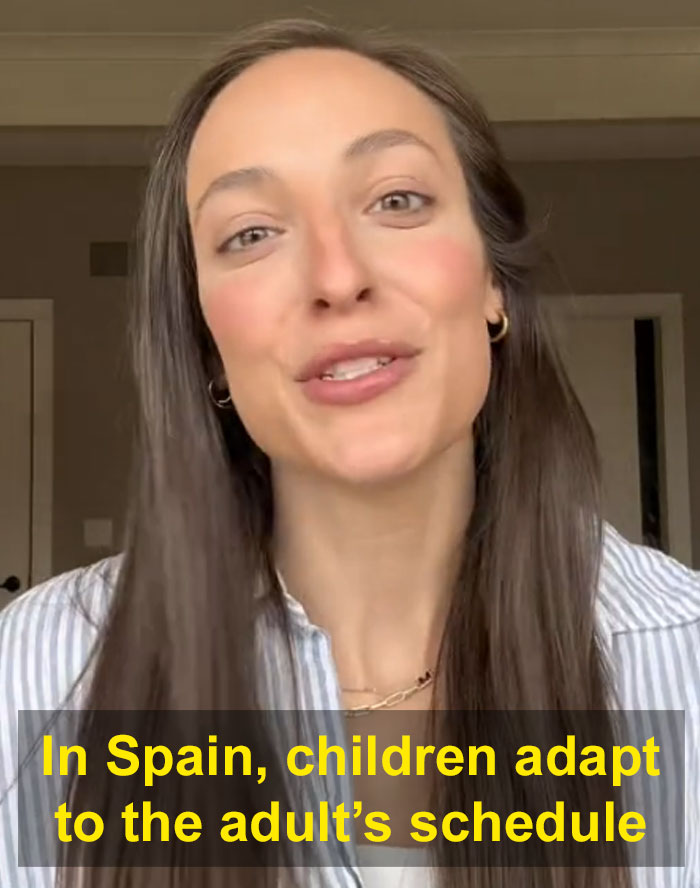
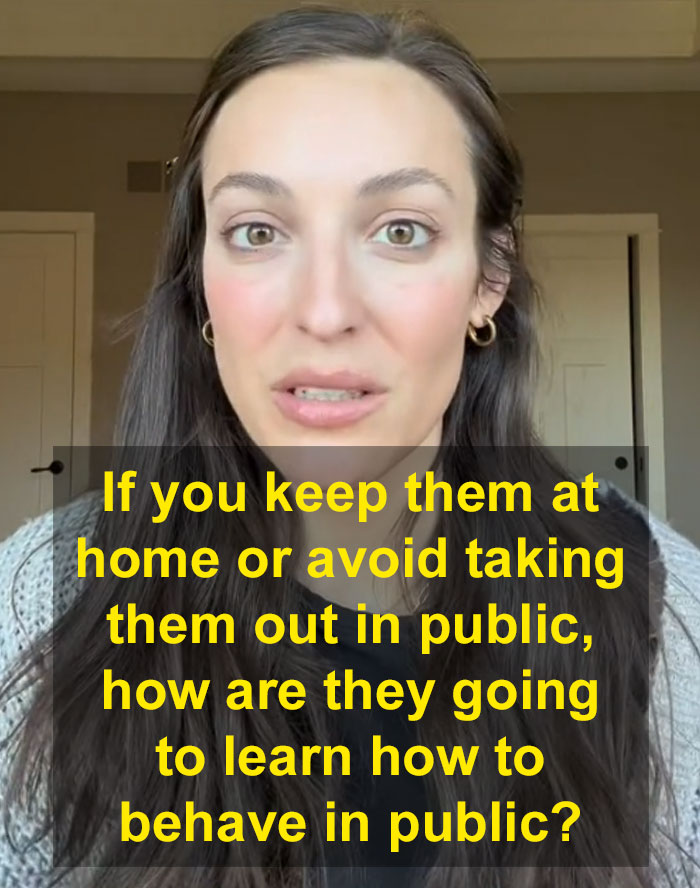

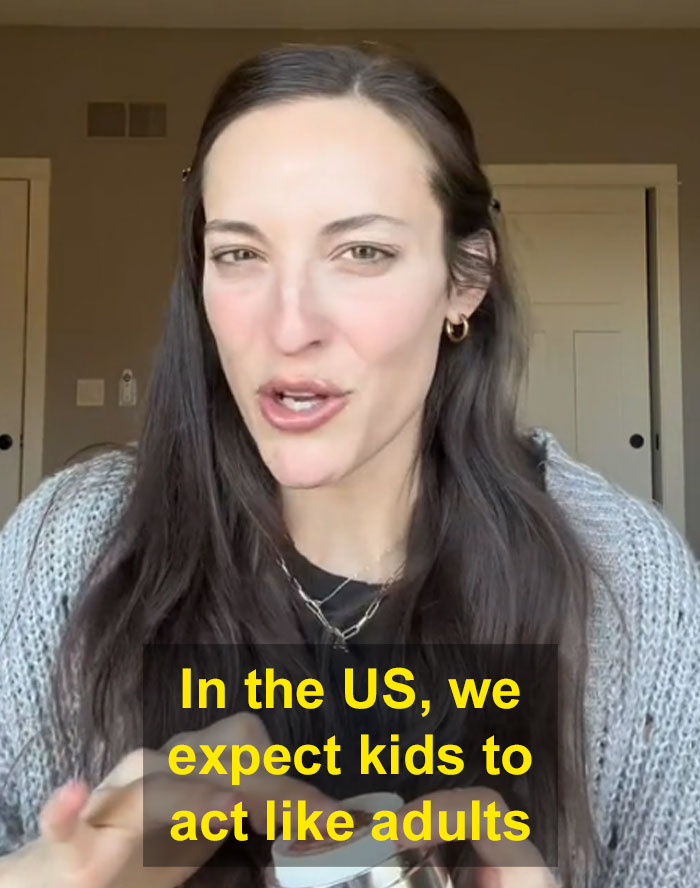
ConversionConversion EmoticonEmoticon